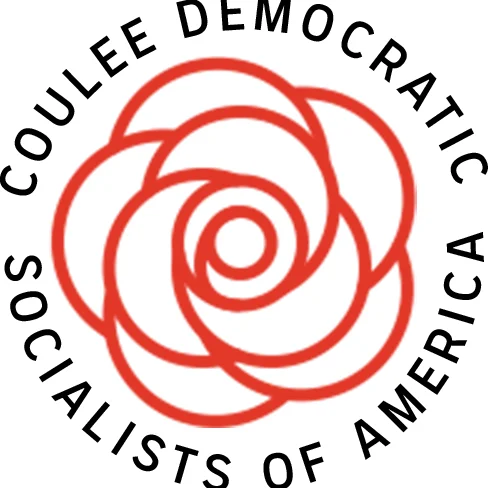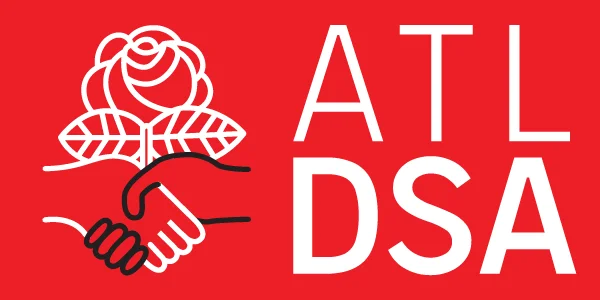

2022 Congressional Race

The Syracuse DSA chapter was mentioned and one of our co-chairs quoted in a recent Intercept article in relation to the Congressional race. Since the Intercept reporter spoke with us, Steven Holden has contacted us.
https://theintercept.com/2021/08/11/steven-holden-new-york-house-democrat-2022-midterms/


Coulee DSA Reads: A Libertarian Walks Into a Bear
Coulee DSA’s reading group keeps trekking on! Next up on the reading list is a fun book that promises to be have more humor than most of our entries. Matthew Hongoltz-Hetling’s A Libertarian Walks Into a Bear tells the story of an attempted Libertarian utopia that, to no one’s surprise, goes awry. Check out an interview with the author here. If it sounds interesting, email us at CouleeDSA@gmail.com to get hooked up with the book club.

The post Coulee DSA Reads: A Libertarian Walks Into a Bear first appeared on Coulee DSA.

The Terror of Empire


City Council Betrays Working People to Build Cop City
Today, the Atlanta City Council showed its true colors, choosing to ignore vocal opposition by thousands of working-class residents in favor of Atlanta’s corporate elite on the board of the Atlanta Police Foundation. Despite over 16 hours of public comment with 70% of resident callers against the proposal, and despite a survey showing that 98% of Atlanta residents oppose building Cop City, the following Council-members have voted to put profits over people, clear-cut Atlanta’s historic forest, and build an 85 acre, $90 million Cop City: Joyce Sheperd, Andre Dickens, Cleta Winslow, Dustin Hillis, Matt Westmoreland, Michael Julian Bond, Andrea L. Boone, Howard Shook, Marci Overstreet, J.P. Matzigkeit.

Over the last three months, Atlanta DSA has organized weekly canvasses in neighborhoods most directly impacted by the proposed facility, speaking with residents in Atlanta City Council’s 5th and 12th districts and in Dekalb County’s Gresham Park. Despite attempts by City Council, APF, and the corporate media to manufacture consent for the proposal, our outreach affirmed that the community overwhelmingly opposes the development, with over 1,000 residents signing our petition to Stop Cop City. While City Council actively obstructed all meaningful opportunities for public input, we organized a truly democratic People’s Town Hall attended by over 100 residents who came to express their stance against Cop City. The message from working-class Atlanta is loud and clear: Stop Cop City.
Yet despite the clear public opposition from Atlanta’s working class, despite the rallying cries from the public over the last year to defund the police state, despite the human and environmental harms that will result from deforestation as we face the threat of climate change, this City Council once again sided with corporate Atlanta over their own constituents.
If anything, this vote has reinforced that as long as we live under capitalism, and corporate “philanthropists” maintain their grip over City policy and priorities, the same neoliberal villains that brought us Cop City will continue to bring us dystopian proposals until the working class stands together and organizes for real change.
Despite the disappointing vote, the Atlanta Democratic Socialists of America will continue to organize working class people in the struggle against the billionaire elite. We will continue to organize to abolish policing and mass incarceration. We will continue organizing towards universal housing, healthcare, food for all, and a Green New Deal. The campaign to Stop Cop City has only strengthened and emboldened the working class as a serious political force in Atlanta. If anything, this campaign has confirmed that we can build mass movements to take back power from the corporate elite. We can build a society that invests in communities over the carceral state. It’s more clear now than ever that when ordinary working people come together, we can wield our collective power through organization.
We invite you all to join us in these future struggles towards liberation. To learn more about this campaign and our future work, tune in next Wednesday, September 15th at 7pm, for an online debrief call as we review all we’ve learned and accomplished over these last months, and analyze the final vote and what it means for November’s elections. As always, we invite those committed to joining our future fights to organize in solidarity with us and join DSA.

Stronger Together: RPM Crew Social and Fundraiser!
It’s a Revolutions per Minute social and fundraising extravaganza! Tonight we’re taking a break from our usual format to share a peek behind the scenes of the Revolutions per Minute collective: who we are, why we organize community radio for NYC-DSA, and why we support WBAI 99.5FM. Hear from our RPM hosts, producers, and behind the scenes comrades during this relaxed, casual show that emphasizes the importance of movement-based community media.
Please consider giving to WBAI in the name of Revolutions per Minute. Monthly donations of any amount are appreciated, and giving $25 in a calendar year makes you a voting member of the station! To donate, visit give2wbai.org. We have more cool rewards coming, so keep listening and check back!
To pitch a story for coverage on Revolutions per Minute, visit bit.ly/pitch2RPM.
If you’re a member of NYC-DSA looking to learn more or get involved with making RPM, please visit bit.ly/RPMJoinForm.
This episode was recorded remotely during a night of heavy rain and catastrophic flooding in New York City. We urge you to join NYC-DSA's Ecosocialist Working Group or another local formation and get involved with the struggle to protect workers and tenants against climate catastrophe.


Don't Let Bitcoin Mining Ruin Seneca Lake

This article and photo appeared as a Letter to the Editor in Syracuse.com on August 4th, 2021.
Bitcoin has come to the Finger Lakes, and the results are potentially disastrous. Globally, Bitcoin’s yearly energy usage is higher than the country of Colombia’s, a staggering fact given that Bitcoin’s main use is as a speculative investment tool. But the small-scale effects of this industry are no less drastic, and the appearance of mass Bitcoin mining in our state threaten our state’s energy goals, but also local ecosystems and human communities.
Most of us in Onondaga County know the damage that corporations can do in this regard, as demonstrated by Onondaga Lake. For hundreds of years, the lake was a central to the Onondaga Nation, as well as an important place for the entire Six Nations people, because it is where they founded their ancient democracy. After it was wrongfully taken from the Onondaga Nation, it remained a source of water, food, and recreation for the settler population until a parade of corporations (the Solvay Process Company and Allied Chemical, among others) poisoned the water and turned it into one of the most polluted lakes in the U.S. Swimming was banned in 1940, then fishing in 1970. A half-hearted attempt at cleaning it has been made, but far more work needs to be done before it can once again become a cultural touchstone for our county, and, more importantly, for the people of the Onondaga Nation. This century should be about making amends and healing, reparations and cleanup, not new messes.
Bitcoin is supposed to be online and in “the cloud.” So it shouldn’t have real world environmental impacts, right? Wrong! Bitcoins are actually “mined” using huge quantities of electricity going into computers that produce new Bitcoin by completing complicated mathematical processes. In practice, Greenidge Generation, a natural gas operation the shore of Seneca Lake, recently opened up a facility where 8,000 computers are used to mine Bitcoin powered by its natural gas — a dirty energy source that contributes to climate change and reduced air quality. To accomplish this, the facility draws in huge amounts of water from Keuka Outlet, a smaller body of water that flows into Seneca Lake, and then releases that water at much higher temperatures back into the outlet. Although the lake’s overall temperature is unaffected, this process heats the outlet significantly to such a degree that one local kayaker noted that “you feel like you’re in a hot tub.”
Dale Irwin, the capitalist CEO of the facility, has incredulously insisted that the plant boosts Upstate’s economy because it has “about 35 employees.” The insinuation is that 35 jobs will make a significant contribution to filling the gap created when a previous generation of capitalist ghouls moved their factories away from Upstate New York to places where the workers weren’t unionized. Just like the old factories that contaminated Onondaga Lake with their pollution, Greenidge will no doubt cut and run after it ruins Seneca Lake, but with one big difference: Greenidge employs a whole lot fewer workers!
Make no mistake, this conflict does not fit into the easy box of “the economy vs. the environment” with workers on one side and activists on the other. The increased temperature in Keuka Outlet puts it at risk of developing algal blooms, which threatens the drinkability of water in the entirety of Seneca Lake, just as it did recently in Lake George. City water departments throughout New York state are now on constant alert for these algal blooms that threaten our health. In fact, the state’s Department of Conservation just provided tentative approval for the Syracuse Department of Water to chemically treat Skaneateles in the event of just such a bloom.
But this environmental health matter is also about jobs. Seneca Lake Guardian’s Yvonne Taylor points out that Seneca Lake “is a drinking water resource for 100,000 people” and that “this is the heart of Finger Lakes wine country. We are now currently supporting 50,000 jobs ... All that is 100% dependent on our clean water and clean air.” This conflict is not the economy vs. the environment, it’s 50,000 jobs, our water supply, and our environment vs. 35 jobs and the soulless profits of Greenidge Generation.
This is an important moment when things can be fixed or continue to get worse: Greenidge’s air permit is up for re-evaluation in September for the first time since it began mining Bitcoin, so we have less than two months to rid the region of this dual environmental and economic threat. This is an all-hands-on-deck moment for everyone in Central New York who cares about health, employment, and the environment. Many communities are mobilizing — in Syracuse, for example, Democratic Socialists of America is reaching out to environmental, labor and community organizations to address this urgent matter. Let’s leave capitalists that pump their waste into New York’s lakes in the last millennium.
-Mac Carden, Syracuse DSA EcoSocialist Committee

Green New Deal for Public Schools
This summer the IPCC released another devastating report on the climate crisis driven by fossil fuel capital, as like most of the country, we saw the impacts of climate change right here in NYC with heat waves and record rain. Tonight we’ll talk with Ecosocialist comrades Brittany Allen and Gustavo Gordillo about how DSA is taking the climate fight to one of the most essential yet resource deprived institutions across the country - our schools- with the Green New Deal for Public Schools campaign.
To join the national campaign for a Green New Deal for Public Schools: https://greennewschools.com/join
To join NYC-DSA Ecoscialists: https://ecosocialists.nyc/join-us/
Follow NYC-DSA EcoSocialist Working Group on Twitter: @NYCDSA_Ecosoc
Follow NYC-DSA EcoSocialist Working Group on Twitter: @NYCDSA_Ecosoc

The Right to Stay Home with Jabari Brisport
Even with Cuomo out of office, our state still faces a housing crisis. This week, The Supreme Court has issued a temporary injunction against the "Emergency Eviction and Foreclosure Prevention Act," also known as the New York State's Eviction moratorium. This immediately suspends the eviction protections for tenants included in that law. Up to 40 million Americans could face eviction due to the ending of the eviction moratorium. For some, it's fifteen months worth of back rent- and in more expensive cities like NYC or Portland where rents have skyrocketed after the 2008 mortgage crisis, that can mean up to $31,500 - due immediately.
As the Delta variant surges with 619,000 deaths in the last 30 days and hospitals filled to breaking point from Florida to Texas (including 90,000 hospitalized children in the last week alone), the pandemic is certainly not over. And with only 71% of adults vaccinated and children under 12 ineligible for a vaccine, it won’t be ending any time soon either.
Tonight, we hear from State Senator and NYC-DSA member Jabari Brisport about the plans from the DSA Socialists in Office in New York State's legislature to fight for housing as a human right - and the right for all of us to stay at home during COVID 19.
Here are resources via the Met Council on Housing on what to do if you are facing eviction:
DO NOT SELF-EVICT! DO NOT MOVE OUT! It is extremely important to remember that evictions proceedings are long and there are other anti-eviction laws in place.
How can you protect yourself now?
1) Apply for the Emergency Rental Assistance Program (ERAP): If you apply for this program, your landlord cannot move forward with your eviction. This is the strongest protection we have to keep people in their homes.
2) Sign up for the federal CDC moratorium: The federal government has extended its moratorium to October 1st. It is not as strong as the NY State Eviction Moratorium but if you sign the CDC declaration of hardship, it will provide you with a defense in court if your landlord tries to evict you
3) Join your building’s tenant union, or reach out to CASA, Crown Heights Tenant Union or Met Council on Housing for housing help, resources to start your own tenant union or you can also call 311 for available city resources.
We here at RPM stand in solidarity with tenants across the country.

Sand in the Gears with Julia Salazar
Senator Julia Salazar of NY-18 was elected in 2018 after winning an insurgent, grassroots campaign powered by NYC-DSA as well as many movement allies. Three years later, she’s serving her second term in Albany as the chair of the Women’s Issues Committee and the chair of the Crime Victims, Crime, and Corrections Committee.
On tonight’s show, we speak with Senator Salazar as well as her Organizing Director and fellow NYC-DSA member, Ramon Pebenito. Dismantling the carceral system requires all of us to exercise our power to slow, stop, or mitigate the harms of police and prisons, or to throw “sand in the gears” of the machine of bureaucratic state violence wherever we are. In this episode, we hear from Senator Salazar on her surprise visits to NY State correctional facilities and from Ramon on over-policing in New York’s district 18.
You can find Senator Salazar on Twitter @SalazarSenate or visit her official website:

One Struggle with Joel Brooks and North New Jersey DSA
We may be across a “state” line from each other, but organizers in New York and New Jersey know what unites us is much more than what divides us. On tonight’s show, we’re joined live by our comrades from North New Jersey DSA to discuss their chapter’s organizing to abolish ICE and close immigrant detention facilities, conduct mutual aid and harm reduction work with their communities, and elect socialist and union leader Joel Brooks to City Council in Jersey City.
To learn more about Joel Brooks’ campaign for City Council, visit https://www.joelbrooksforjerseycity.com/ or follow @VoteJoelBrooks.
You can reach out the North New Jersey Mutual Aid Working Group at: nnjmutualaidwg@gmail.com or contribute to their fundraiser for the Ramapough Lunaape Turtle Clan’s Munsee Three Sisters Medicine Farm in Newton, NJ: https://www.gofundme.com/f/RLsolidarity
Click here to learn more about the North New Jersey Immigrant Justice Working Group: https://linktr.ee/ImmigrationNNJ
To learn more about North New Jersey DSA, visit https://north.dsanj.org/ or follow @NorthNJDSA.